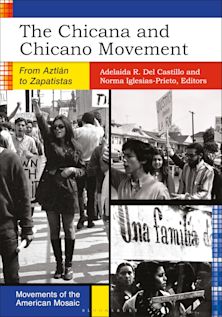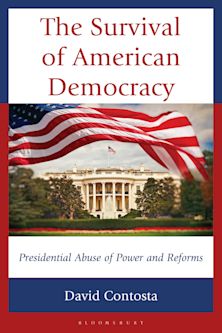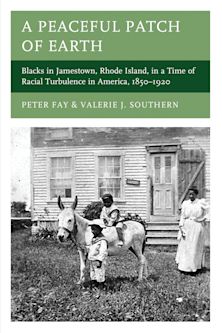- Home
- ACADEMIC
- History
- United States History
- A Nation Can Rise No Higher Than Its Women
A Nation Can Rise No Higher Than Its Women
African American Muslim Women in the Movement for Black Self-Determination, 1950–1975
A Nation Can Rise No Higher Than Its Women
African American Muslim Women in the Movement for Black Self-Determination, 1950–1975
This product is usually dispatched within 2-4 weeks
- Delivery and returns info
-
Flat rate of $10.00 for shipping anywhere in Australia
You must sign in to add this item to your wishlist. Please sign in or create an account
Description
A Nation Can Rise No Higher Than Its Women: African American Muslim Women in the Movement for Black Self Determination, 1950–1975 challenges traditional notions and interpretations of African American, particularly women who joined the Original Nation of Islam during the Civil Rights-Black Power era. This book is the first major investigation of the subject that engages a wide scope of women from “The Nation” and utilizes a wealth of primary documents and personal interviews to reveal the importance of women in this community. Jeffries reveals that women were respected in the movement and maintained a very clear and often sought after voice in the advancement of the Original Nation of Islam.
A Nation Can Rise No Higher Than Its Women replaces the typical portrait of the subservient and irrelevant African American Muslim woman with a far more accurate picture of their integral leadership and substantial contributions to the rise of Islam and black consciousness in the self-determination movement in the United States and beyond during the Civil Rights-Black Power era.
Table of Contents
Introduction
Chapter 1
Upon the Education of Its People Rests the Fate of a Nation:
The Struggle for Self-Determination
Chapter 2
African American Muslim Women in the Nation of Islam Movement:
Appeals, Benefits, and Outcomes
Chapter 3
“Raising Her Voice”: Writings By, For and About Women in Muhammad Speaks Newspaper
Chapter 4
African American Activism: The Muslim Community Contribution, 1960-1975
Chapter 5
Crossing Borders: Toward a Transnational Narrative in the Struggle
Notes
About the Author
Selected Bibliography
Product details
| Published | 15 Dec 2015 |
|---|---|
| Format | Paperback |
| Edition | 1st |
| Extent | 200 |
| ISBN | 9781498532297 |
| Imprint | Lexington Books |
| Illustrations | 18 b/w photos; |
| Dimensions | 229 x 152 mm |
| Publisher | Bloomsbury Publishing |
About the contributors
Reviews
-
Jeffries's account provides fascinating insight into the experiences of African American Muslim women and their contributions to the Nation of Islam. In this much-needed treatment of a little-studied subject, the author reveals much about not only the women themselves, but also the broader communities of which they were a part. Using an array of published sources and oral histories, Jeffries explores women's motivations for joining the nation, how they crafted their identities, and the various ways in which they embraced the movement for self-determination. She pays particular attention to women's contributions in the realm of education as well as to the role that their writings played in challenging white models of beauty, diet, and public welfare. The book also highlights the transnational dimensions of these activities and includes a short case study on Bermuda. Summing Up: Highly recommended. Undergraduate collections and above.
Choice Reviews
-
Jeffries creates the first, substantive, and far-reaching examination of women in the Nation of Islam. Studying the era of its most explosive growth and influence, the author explores the complexities of gender, class, and race in the Nation, as well as the varied roles and experiences of Muslim women, many of whom were drawn to the organization seeking a refuge from racism, as well as affirmation, and protection in ways assumed to be unavailable outside of Islam.
Jeffrey Ogbar, University of Connecticut
-
Most studies about the women in the Nation of Islam have attempted to 'correct' the general absence of women in viewing the history of this group. Such works have been overwhelmed with defending the presence of women as essential to the working of the ONOI, especially in developing strong, proud children who would promote racial pride and economic stability. They have also attempted to show the strength of these women and how their efforts have been germane to the birth and growth of ONOI, especially its public educational wing. However, Bayyinah S. Jeffries has expanded the narrative. She has introduced us to the women of ONOI and why they joined the Nation. She has explored the creation of the educational system of the Nation by Sister Clara Muhammad and others, beginning with taking their children out of public schools and home schooling them… Though the women of ONOI have not been recognized and honored as their counterparts in the civil rights movement, they made key contributions in the liberation of black people during the mid-years of the twentieth century. This is the strength of Jeffries’ book. Like Josephine Silone Yates said years ago, a race cannot rise above its women, and ONOI would not have such a legacy without its committed female warriors.
Jacqueline Anne Rouse, Georgia State University
-
Bayyinah S. Jeffries has provided a fresh analysis of examining the Nation of Islam from an Afrocentric perspective. Her study offers a cultural and gender assessment of an Africana social movement in the United States. Lastly, Dr. Jeffries has made an impact and lasting contribution to the intellectual history of research and writing of Africana Islamic studies.
James L. Conyers, Jr., University of Houston
-
Nation women defied convention and gave us a new standard for womanhood and Black dignity. They exemplified order and discipline and taught us how to march to a different drummer. They also embodied the divine word and helped to build a movement that inspired us for over eighty years. Bayyinah Jeffries dares to take us inside the world of these remarkable women, a world too few of us know, and the rare voices she allows to speak in this volume must be heard.
Zain Abdullah, Temple University

ONLINE RESOURCES
Bloomsbury Collections
This book is available on Bloomsbury Collections where your library has access.



































